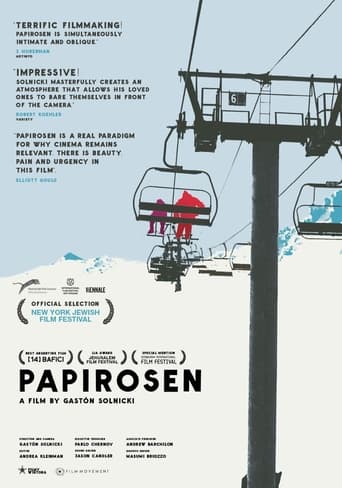
A portrait of Argentine director Gastón Solnicki's family over the course of the second half of the 20th century, Papirosen follows four generations still troubled by a war that’s never spoken of. The film juxtaposes different periods with their native image formats, along with landscapes, characters and international political events, as it focuses on a singular decade of a nouveau riche Argentine Jewish family, and the new generation’s introduction into familiar traumas and vitality.
Reviews
Truly Dreadful Film
Absolutely brilliant
Not sure how, but this is easily one of the best movies all summer. Multiple levels of funny, never takes itself seriously, super colorful, and creative.
Through painfully honest and emotional moments, the movie becomes irresistibly relatable
At some point (as we learn near the end of the documentary) director Gastón Solnicky decided to record the goings-on in his family, including squabbles, separations, pleas for money and adherence (or lack thereof) to Jewish rituals and customs by diverse family members. By their statements we learn that Grandmother and Grandfather emigrated to Argentina from Poland illegally, Grandfather could not cope with Holocaust memories, and that from the relatives that could not flee Poland, no one survived. The family looks solidly middle class, integrated in Argentina (everyone except Grandmother Pola speaks with perfect Buenos Aires accent) without loss of their Jewish identity.To his own filming Solnicky adds other materials like old home movies, presented in no particular order and a VHS of a bar mitzvah, which completes the movie in an upbeat note. The film holds together well, in spite of being essentially a home movie. As home movies go, there is a bit of staginess and play-acting here and there.Papirosen (or Papirosn) means "cigarettes" in Yiddish. It is the title of a song, popular in Poland and Russia especially during WWII. Pola sings the beginning in one scene.
Top Streaming Movies












